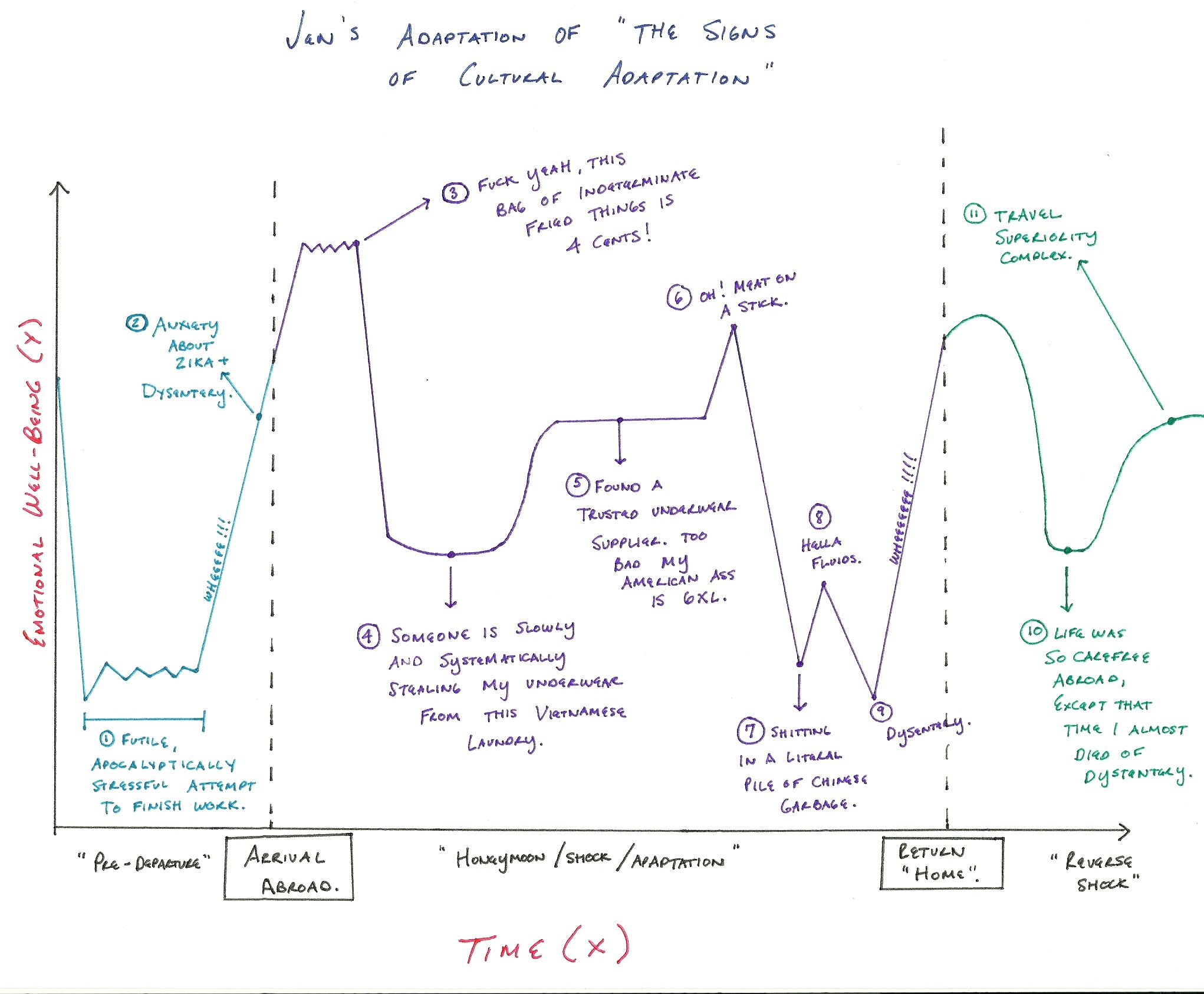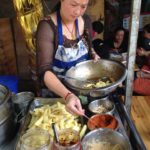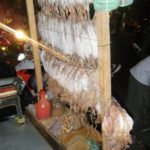
—
All of my major, illuminating conversations with my father usually take place in a car, en route to the airport on Houston’s Beltway 8. I still have not figured out why these drives have been the literal vehicle to our relationship – perhaps it’s the desire to mask the terrible easy listening station, or the monotonous freeway scenery in our peripheral vision, or my father’s need to be candid now that months will pass before we will see each other again.
This trend started when I was 18, mere hours before I would fly to my first day of college in Washington DC, with a conversation that began in our car and continued into terminal A of Houston’s Intercontinental Airport.
He began: “Did you know that your grandfather died in a re-education camp?”
I’ve thought and wrote about that conversation for more than a decade. It was a statement that became an obsession with the historical circumstances leading to my grandfather’s death.
Now, I am 30 and still need to be driven to the airport. It’s an early Saturday morning and my final destination is the city I have recently labeled a second home – San Francisco. I’ve spent the past 10 years piecing together my family history and my dad has been much more open to all the questions I have about his prior life – the escape from Vietnam, his lonely arrival to the United States, the drunken lady-chasing, the constant struggle lingering in his life as a Vietnamese man with US citizenship.
“Can I ask you something?” he says, interrupting the synth melody emanating from the god-awful “work friendly” radio station.
I’m anticipating another significant life event to add the patch worked narrative in my mind so I say, eagerly, “Sure, dad.”
“What do you think of me dating again?”
I am befuddled by the situation. No one coaches you on how to react when you’re father casually informs you that a family members has died for political reasons in a Vietnamese re-education camp. Likewise, I’ve never been advised on how to approach a dating conversation with my 67-year-old father.
More confounding is this – for the first time, we’re not taking about his past or my next steps. It’s about his future now.
—
My relationship with my father is complex, enshrouded with feelings of guilt, misunderstanding, lost history, and a tension that naturally develops when two people share the same personality, but are divided by historical luck, cultural upbringing, and a generation.
I often imagine our relationship to look like one long, continuous steel beam – I’m positioned on the left edge, he on the right. In the middle, a fulcrum positions us in a constant, precarious pivot. Each gain on my side shifts the balance in my direction, lowering him further and further into the ground. Equilibrium in our relationship feels like an impossible illusion.
A few months after I graduated from college and proudly landed my first job, my father lost what would become the last job he would ever work. Our working-class family has always been susceptible to the ups and downs of an oil-dependent economy, but the cycle has, to this day, never come back up for him.
A few years later, I flew back home to Houston during a Christmas holiday with two goals – to help plan my parents’ 30-year anniversary party and to formally “come out” to my parents. I remember the intimate family gathering – a small room with a little bit of champagne and re-prints of their wedding photos with “Happy 30th Anniversary” scrawled across the gloss. It was followed, a few days later, by my pre-dawn “coming out” to my father before his daily walk. He cried, blamed himself, but ultimately relented to his philosophy – life’s too short, be happy, don’t waste time.
As I entered my long-term relationship with my partner, Tracy, I concurrently witnessed the formal dissolution of my parents’ 30-year marriage. As a bystander to their marriage, it was a long-due decision. Their union was a strained pairing which felt analogous to a steam burn – a simmering, innocuous pain that seared relentlessly once you step away from the source of what is hurting you. I remember sitting in a hostel in Paris, simultaneously writing transatlantic postcards to Tracy while reading divorce paperwork that had been transmitted through e-mail. It’s an odd feeling to write in cavalier, romantic language and to read, in legalese, all the reasons someone needs to leave you.
Now, as I try to build a life with my partner, my father has worked to minimize his belongings and luxuries to fit into his single life on a slender budget. No amount of phone calls or digital zaps of money can bridge the physical and emotional gulf of our lives. We’ll always be at two ends of a steel beam, swiveling back and forth.
—
My proudest moment in adulthood was standing behind my father as he led a tour of the townhouse he had managed to purchase. After months of moving from one bad living situation to another, he had decided to take half of his savings and invest it in a small two-bedroom place that he could call his own.
Each time Tracy and I visit, he has a customary protocol. He opens the door and you walk into the kitchen.
“How you doing?” he will say to me.
“How y’all doing?” he’ll say if I’m with Tracy.
He offers you a plastic bottle of cold water from a fridge that, at most, has 10 items. He tells you to sit down on the used floral patterned couch he bought from a friend. It’s seated in front of a flat screen television that he purchased on a 5 AM Black Friday excursion at Wal-Mart.
To the left of the TV, there is a built-in shelf. A single shelf is occupied by a gift my partner and I purchased a few years ago – now empty beer bottles, which once held a craft Belgian ale. To the right of the sofa, is a kitchen counter. Typically, there are three items perched on the counter: a loaf of white bread, a fresh pineapple and a rose he placed in a used plastic water bottle with ridges slightly dented from his grip.
His physical space is a manifestation of his current lifestyle – simple pleasures, reflective, and sparse.
“I like it,” he describes of his living arrangement as we’re driving – he towards the airport, me towards San Francisco.
“I like it, but it can be lonely.”
—
“What do you think of me dating again?”
I look at him anticipating self-deprecating laughter that usually rescues me from responding to his statements. Unfortunately, he’s fucking serious.
I’ve engaged in dating conversations with countless people, most of who are not my father and are not 67-years-old. Many of these conversations end with my watching with fascination as they swipe left or swipe right on their smart phones with bored indifference.
I think of the steep learning curve my father – a man who spent a lifetime cutting pipes for oil companies – endured to learn how to right click a mouse. I think of the incredible frustration I felt trying to navigate the more advance skill of double-clicking a mouse. The man handles a smartphone with the same finesse you would use to mercifully kill a spider – jamming your finger into the glass with disbelief that a machine to can transmit touch to action.
Say something, I think. Say something other than “Please don’t fucking date someone my age.”
“You supported me being with Tracy,” I respond. “So, I’ll support you in any decision you make.”
I started to count the green exit signs to prevent myself from crying.
“Okay, good to know,” he says.
For a moment, I could teetering of our seesaw, an ease toward equilibrium.
—
This year, Father’s Day landed on the same weekend that Houston celebrated Pride. It was beautifully coincidental.
For so many Prides, I’ve searched for individual desires – my self-actualization, my chance at romance, my exclamation of bring queer.
Most of all, Pride, in the thick of the marriage movement, has been about the fight for equality. Typically, what this means is the fight to be considered equal to what is “normative” – legally married (usually to someone of the same race), monogamous with biological children, striving for physical and financial accumulation. There is nothing wrong with this “normative” way of being. There’s also nothing wrong with the “other” way of life.
This year, Pride feels much more communal – the family I will build, the family I am already a part of, and the community I belong to. To celebrate queerness is to celebrate all the familial arrangements whether they are “normative” or not –same-sex couples, interracial couples, foster families, adopted children, chosen families, or non-monogamy.
In my case, it’s a celebration of my family, which, ironically, has been altered by heterosexual divorce, yet developing with a same-sex partnership. It’s about a 67-year-old father looking for an over-50 (thank goodness) educated woman to talk to and his queer daughter looking to build a family.
This Pride, I’m not fighting for equality – I’m hoping for equilibrium.
—
Happy Father’s Day, daddy. Happy Pride, daddies.







